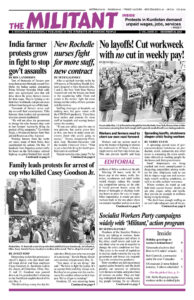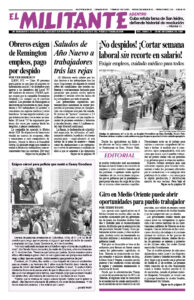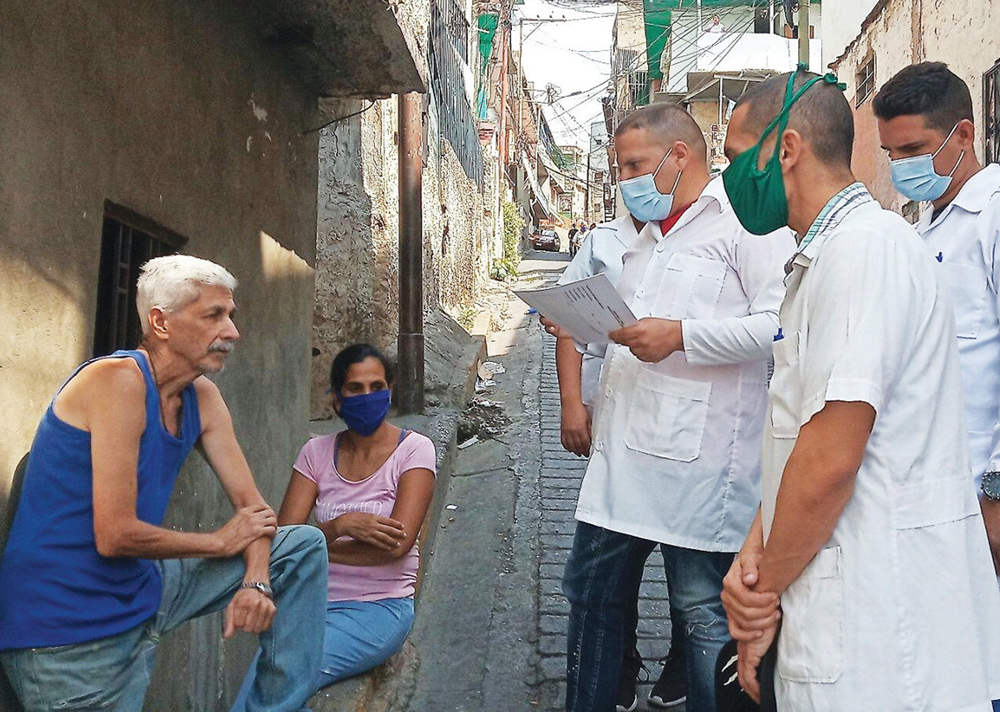The pro-imperialist opposition led by Juan Guaidó that’s seeking to overthrow the government of Nicolás Maduro lost control of the legislature in elections held Dec. 6. Guaidó, with the backing of U.S. imperialism, had declared himself president in January 2019.
In one of the lowest electoral turnouts in the 22 years since late President Hugo Chávez was elected and the United Socialist Party of Venezuela has been in government, its candidates won 189 out of the 277-seat assembly — 68% of the vote. Less than one-third of eligible voters participated. The opposition bloc split, with the faction led by Guaidó boycotting the election and other parties participating, winning 28% of the vote.
The outgoing National Assembly, elected in 2015, had been controlled by the opposition.
Trying to take the sting out of the blow to the drive to overthrow Maduro, Secretary of State Mike Pompeo claimed the government rigged the elections. British and other European imperialist governments joined Washington in refusing to recognize the vote. Guaidó announced he plans to continue his presidential “functions” beyond Jan. 5, when the old National Assembly’s term ends.
Both U.S. administrations of Barack Obama and Donald Trump have imposed harsh economic and trade sanctions against Venezuela, and have backed attempts to provoke a coup against Maduro. The failure of these efforts has split the opposition.
Some opposition forces now promote a negotiated political solution and reject Guaidó’s calls for even more sanctions. Two-time opposition presidential candidate Henrique Capriles called for an end to Guaidó’s supposed “interim government.” The incoming U.S. administration, he said, should “understand that this plan has been exhausted.”
Guaidó proclaimed himself president while he was head of the National Assembly, claiming Maduro’s reelection in 2018 was a fraud. Washington and European and Latin American governments were quick to recognize the new “legitimate” government. They used it as cover to further attack Venezuela’s sovereignty, seizing assets deposited in foreign banks, and those of Citgo, a U.S.-based subsidiary of Venezuela’s state-owned oil company, and by taking more far-reaching steps to block international trade.
The Guaidó-led opposition’s support for imperialist economic sanctions — even during the COVID-19 pandemic — is not popular among working people in Venezuela, who are hit hardest by them.
“What do I get with Guaidó traveling around the world preaching? Guaidó can have good relations with the United States, but how does that benefit Venezuela?” Ajeieh Emghaoech told the Militant by phone Dec. 12. A resident of the Los Picapiedras neighborhood in Baruta, she said she didn’t vote in the elections because “nothing is going to change.”
Following the Dec. 6 vote, the weakened opposition forces around Guaidó organized a six-day online and smaller in-person “popular consultation.” They claim 6.5 million voters responded to their poll asking if they want a change of government and whether they reject the results of the elections. The online vote was open to the over 4 million Venezuelans who have fled the country in recent years. There is no way, however, to verify their turnout claim.
“No one could think that an internet consultation has legal value,” Maduro said Dec. 10.
Washington’s sanctions have deepened the economic and social crisis working people face. Shortages of medicine, food and other basic necessities — at prices working people can afford — are widespread.
U.S. sanctions that block Venezuela’s oil exports and imports — and the collapse of production in local refineries, the country’s main industry — have created widespread gasoline shortages affecting public transportation, production and transport of crops. The government has limited distribution of gasoline at subsidized prices — about 10 cents a gallon — to roughly two tankfuls a month. Mileslong lines at gas stations in Caracas, even longer in other states, are a common sight.
“Luckily my day falls on Saturday,” Jeison Balderramo, a welder, told the Militant. “I can queue up Friday night and be there at sunrise before they start selling. Otherwise I would have to miss work!” As an alternative, if you can afford it, said Balderramo, you can go to what he called the “reliable route” (vía confiable ), which is to pay a $10 bribe to the policeman monitoring the line so you can jump ahead.
In wealthier neighborhoods, gas remains available at much higher market prices in dollars.
President-elect Joe Biden has said he will continue to back Guaidó and maintain sanctions against both Venezuela and Cuba. Elliot Abrams, the Trump administration’s special representative on Venezuela, says there is a strong bipartisan consensus in Washington over the need to keep pressure on the Maduro government.
Revolutionary Cuba has continued to call for U.S. hands off Venezuela and support the sovereignty of the Venezuelan people.


